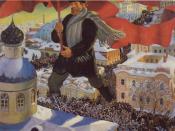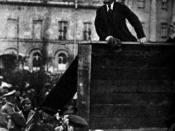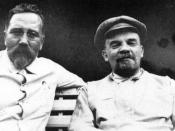Will Donovan
The Russian Revolution was a revolution. Let me clarify this by saying it was the same as other revolutions in that it had strong leaders, leaders who could incite revolution, lead the oppressed, were eloquent of speech and had deep rooted political beliefs. Of course, this is only true in successful revolutions, and the Russian Revolution was a successful one.
The two main political parties leading the revolution were the same party at one point. They were the Russian Social-Democratic Labour Party until a dispute arose in 1905 between Vladimir Lenin and Jules Martov, two of the party leaders. Lenin argued for a small party of professional revolutionaries with many non-party supporters. Martov disagreed, believing it was better to have a large party of activists. The party split based on loyalty and allegiances, with many party supporters agreeing with Martov and siding with him. Although Martov had more supporters, Lenin had more party leaders.
It is because of this that the parties got their names. Menshevik is derived from the Russian word Men'shinstvo (Minority), while Bolshevik is derived from Bol'shinstvo (Majority). Both factions believed that Russia was not developed enough for socialism and that the Tsarist overthrow revolution they would lead would be a " Bourgeois" democratic revolution (2). The Bolsheviks felt that the working class should lead the revolution along with the peasants. The Mensheviks' goal was a democratic revolution where the upper class educated members of the party could take part in the government.
After the split, they went their separate ways politically. The Bolsheviks had a different set of ideals and plans than most groups. They had an immediate plan of what to do when they seized power, and plans having to do with the time after that. The Bolsheviks also wanted to take...


